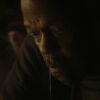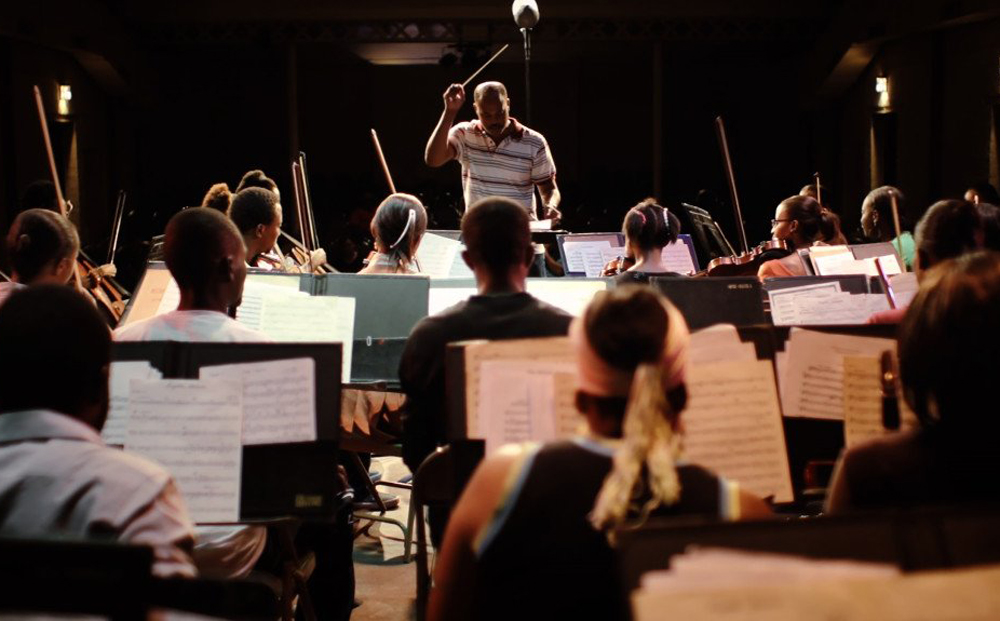When Owsley Brown first stepped foot in Sainte Trinité Episcopal Church in Port-au-Prince in 2007, he couldn’t have known where it would lead. What he could tell immediately was the way the way that music carried through the halls, hearing from one quarter the boys’ choir that had become a famed component of the school and from another, a philharmonic orchestra. These were the things that led him from the States, where he had made music documentaries “Night Waltz: The Music of Paul Bowles” about the avant-garde composer from the 1930s and the Louisville Orchestra profile “Music Makes a City,” to traverse the Atlantic to find much to his delight a group of compassionate faculty including the school’s musical director Father David Cesar, cellist teacher Bernadette Stella Williams and fellow instructor Nicole Saint Vincent were carrying on the tradition started by a nun during the 1950s to help the young and impoverished find their voice in the power of song.
Brown’s “Serenade for Haiti” would be moving if he had only documented his initial visit, but the filmmaker was compelled to return in 2010 just after the country was hit with a devastating earthquake and once more in 2014 to track the progress of the rebuilding effort. But in revisiting Father Cesar, Williams, Saint Vincent and a young student named Marc Valens, who grows up before our very eyes, the filmmaker captures something particularly profound in demonstrating how the school’s commitment to the community has created an institution that transcends its physical roots to endure as a cultural one, a resistance to challenging circumstances that “Serenade for Haiti” shows has strengthened over time as a response to various political interventions. After making its world premiere at DOC NYC last fall, Brown is traveling to the Miami Film Festival this week to bring the sweet sound of Sainte Trinité to South Beach and to mark the occasion, he spoke about the unexpectedly decade-long project, the importance of preserving Haiti’s rich musical history and pulling emotions out of the notes he was hearing visually.

I started noticing my own interest in stories about the goings on in Port-au-Prince that were being told to me by a fellow that my dad grew up with named Steven Davenport. He described 25 years of work principally through the Episcopal Church network in Haiti and just how amazing and rich the experiences had been for him. At a certain point, after hearing these stories, I just said, “Look, I am dying to get down there and see for myself.” [I was working on] my second feature-length doc [“Music Makes a City”] about the Louisville Orchestra, which is my hometown, and I had finished a film [“Night Waltz”] about a composer named Paul Bowles, and on my trip to Haiti, one of the first things that happened was that I was introduced to this music school that Steven and his wife had been big champions of for years. I walked into that place and thought what spirit and what character the place has, just in terms of the quality of the people and what they were doing and I thought the world needs to know about this.
Was this actually conceived as a long-term project or had you planned to just film in 2007 and then fate intervened?
I didn’t know. I wanted to explore and the cameraman that I worked with for the whole time — Marcel Cabrera, who I was working on this other film [about the Louisville Orchestra] — were in a great moment of working together. He is a French guy and I knew he was going to fall in love with what I was seeing [in Haiti] and I was right. In fact, he ended up moving to Haiti after we finished working on the movie and teaching at this wonderful film school in the town of Jacmel for two years. So I wanted to take my time [with the film]. I didn’t know I was going to take as much time as I did – that’s for sure. [laughs] But I felt very humbled by the situation and I had an awful lot to learn and I wanted to do best as I could to be an observer and just see what would unfold.

It was a wonderful exercise. That’s one of the great things about moviemaking is facing those challenges of communicating an in-person experience through a lens and offer that back to an audience, so we worked really hard on that. We tried to be intimate and some of the most successful times that we had were after we had gotten to know everybody a bit. We learned how to be maybe a little less intrusive and I must say, the people themselves that are part of the school are very inspiring. In the case of this school, you’re looking at people who are dealing with unbelievably challenging circumstances — it’s hard to imagine a situation in the world more complex and challenging than Port-au-Prince — yet in spite of that, and I think you can find examples of this all over the world, some of the most difficult situations in the world are producing some of the most extraordinary people. With respect to the filming of the orchestra pieces, we just did our best to in a way be open to what was happening [which] was just a wonderful coming together of musicians who wanted to follow David’s direction and make wonderful music for all to enjoy.
After the earthquake in 2010, was it a challenge to reconnect with people and start filming again?
The school is so well-organized and it’s such a strong community that the reconnecting part was made possible because of the school administrators, specifically David and Bernadette, who was incredibly helpful to us throughout the whole project. It took about a year to get back to Haiti after the earthquake and it was extremely impressive to go back and see Port-au-Prince and also Jacmel. Even after that long, it was very upsetting to get a sense of how devastating it was and when I say impressive, I mean impressive for the horror of the impact, but also on the other side, it was impressive to see the response.
As devastating as that earthquake was, the resilience of the Haitian people is extraordinary. It’s not easy to try and understand how one place could be put through as much suffering I feel the people of Haiti have been put through for the entire history of the country, but as overwhelmed in some ways as I was to see the devastation of the earthquake, I couldn’t help but be humbled by the spirit with which [I saw] as the sun rose that first time, life goes on and people moving on with their lives in — it’s a slightly new age phrase — but in right relationship to the devastation. They weren’t moving on in denial, but in spite of the fact their lives were so utterly impacted by this.

I felt more determined to do what I could to offer some of the inspiration that I felt before and after the earthquake back to the world — and certainly as best as I could to the Haitian people. There’s a lot to do still, and I’m of course so thrilled that we’ve been able to receive this warm embrace from DOC NYC and the Miami Film Festival. Those are wonderful places for us to be able to show the film and hope from there keep going and continue to reach audiences, among them, people in Haiti. It’s inspiring to think the world can be thinking about Haiti at this time and we need to be thinking a lot about Haiti because it is an extraordinary country, our neighbor [that] we need to make sure is a very close friend and ally and that we can work diligently to help creatively solve the things that are challenges to it [because] we can also learn from Haiti to face some of the challenges we face here.
“Serenade for Haiti” does not yet have U.S. distribution. It will play the Miami Film Festival on March 4th at 4:30 pm at the Regal 18.




